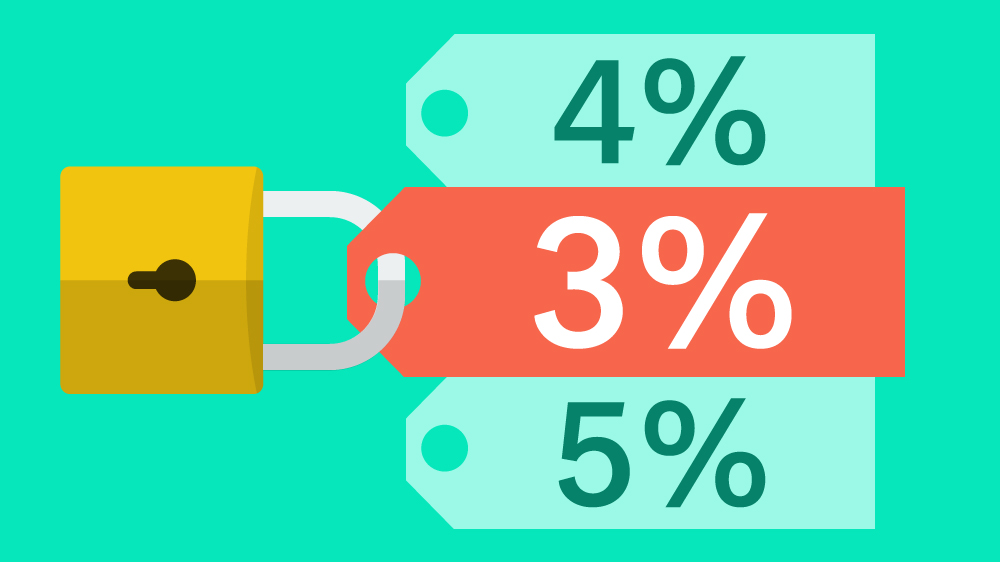Shopping for a mortgage is kind of like playing the tables at Vegas: there’s skill and luck involved. One mortgage game to play is called “mortgage rate lock.” Before you grab a chair at that table (or close on a home for sale in Las Vegas, NV), learn the various situations in which you should — and shouldn’t — lock in a mortgage rate.
-
1. What is a mortgage rate lock?
A mortgage rate lock is an agreement you strike with your lender (not your broker) that allows you to hold the current interest rate for a specified number of days. If you don’t lock, your mortgage rate could change by the time the loan paperwork is finished being processed. And that means your debt-to-income ratio could increase enough that you no longer qualify for your dream home, says Jay Hurst, president of Hurst Lending & Insurance, a Texas-based mortgage lender.
-
2. Should you lock in your mortgage?
This is where your gambling smarts might prove useful. If you think interest rates will rise … lock. If you think they’ll fall, don’t lock, and let your bet ride. You could also wait for interest rates to fall and then apply for a loan, but you might risk losing out on your dream home if you’re not preapproved or the seller has competing offers from other buyers who need less time to close. Ultimately, however, when interest rates are at historic lows, it seems like a no-brainer to lock, and Raleigh, NC, mortgage broker Ryan Fitzgerald emphatically agrees: “Yes! Homeowners should be locking in these rates.”
The rate for a 30-year fixed mortgage in May 2016 was 3.76%. That’s slightly higher than the low in November 2012 of 3.31% but a far cry from about 18% in 1981. Locking also may give you peace of mind. “Rates are sort of like gas prices,” says Hurst. “They usually drift slowly on the way down but can jump up half a point very quickly.”
-
3. There is no sure bet
Read your lender, and if you feel that they might be pushing you into locking, don’t be afraid to call their bluff. It might be the right move, but remember that the “house” (in this case, your lender, not a Vegas casino) has an incentive to get you to lock in your rate. You see, locking isn’t free. “The longer the duration of a loan lock, the more it will cost in terms of basis points that are reflected in the mortgage rate,” says mortgage consultant Martin Hess of Nationwide Mortgage. You might not be charged an upfront fee to lock, but you will be charged a higher interest rate.
Just how much you’ll be charged depends on how long a period you choose. The difference between a 15-day lock and a 60-day lock, for example, could be significant, as much as half a percentage point (50 basis points). On a $300,000 loan, that works out to about $100 more a month.
-
4. Your rate lock period could expire
The shorter the lock period you take, the riskier the bet. The lock will be cheaper, but the loan process might take longer than your lock period. “I recommend a mortgage lock of 45 days because that’s a realistic assessment of how long it will take to close a loan from the moment the application process begins,” says Hess. However, if the lock does expire before you close, all is not lost. “A borrower typically will get one extension to relock a loan for another duration period,” says Hess. But the lender will typically reflect the extension by increasing the interest rate.
A “float-down option” (which automatically readjusts your locked-in rate downward if interest rates decrease) is another route. “If rates happen to fall significantly after you lock in your rate, this gives you a one-time opportunity to lower your rate,” says Colin Robertson, a mortgage lending expert. You might be charged to do this, but not always. Or you could simply try to renegotiate your rate with your lender. Some lenders might agree to new terms to keep your business, says Robertson.
-
5. When to leave the table
If you locked and mortgage rates go down, you lose. You can back out of the deal, but it’ll usually cost you; the lender might charge you a cancellation fee. Make sure you’re educated on the risk and reward so that you can make an informed decision — instead of rolling the dice and simply hoping for the best.


